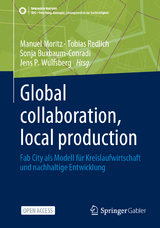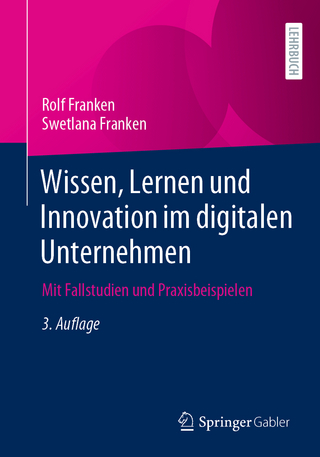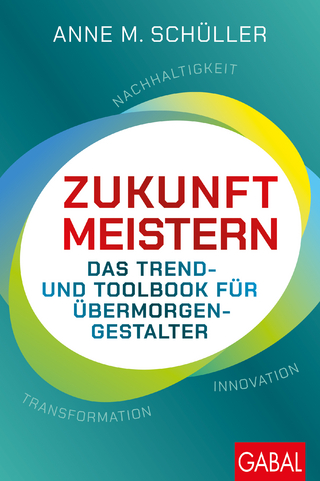Global collaboration, local production
Springer Fachmedien Wiesbaden GmbH (Verlag)
978-3-658-44113-5 (ISBN)
- Ökologisch nachhaltig, indem lange Transportwege vermieden und auf Grundlage von Kreislaufprinzipien lokale Stoffkreisläufe geschlossen werden.
- Ökonomisch nachhaltig, indem durch quelloffene Technologien Wettbewerbsbeschränkungen und durch föderierte Ansätze Abhängigkeiten vermieden werden.
- Sozial nachhaltig durch ein partizipatives Wertschöpfungssystem, in dem der Zugang zu Wissen und Knowhow sowie zu Produktionsmitteln unbeschränkt ist.
Prof. Neil Gershenfeld, Director of MIT's Center for Bits and Atoms, and Chairman of the board of The Fab Foundation:"For many years the growth of cities has been an inexorable trend, with cities acting as regional magnets and engines;the resources enabling a Fab City can also help expand opportunity beyond cities. There is now an opportunity and need for labs that can develop, deploy, and measure the frontiers of Fab City technologies. This book provides a much-needed snapshot of the current state of that challenge."
Tomas Diez, Executive Director of the Fab City Foundation: "This book is an invitation for large-scale collaboration to build distributed system that can support the development of alternative modes of production, in line with the social and ecological needs of our time."
Dr. Manuel Moritz ist wissenschaftlicher Mitarbeiter am New Production Institute, einer interdisziplinären Arbeitsgruppe des Laboratoriums Fertigungstechnik an der Helmut-Schmidt-Universität, Hamburg. Sein Forschungsschwerpunkt liegt auf kollaborativen Innovationsprozessen und Open Source Hardware. Dr. Tobias Redlich leitet das New Production Institute, eine interdisziplinäre Arbeitsgruppe des Laboratoriums Fertigungstechnik an der Helmut-Schmidt-Universität, Hamburg. Seine Forschung konzentriert sich auf neue Wertschöpfungsmuster in der Bottom-Up Ökonomie. Dr. Sonja Buxbaum-Conradi ist wissenschaftliche Mitarbeiterin am New Production Institute, einer interdisziplinären Arbeitsgruppe des Laboratoriums Fertigungstechnik an der Helmut-Schmidt-Universität, Hamburg. Ihre Forschungsschwerpunkte sind globale Produktionsnetzwerke, verteilte Wissensprozesse und Open Source Hardware-Communities. Prof. Dr. Jens Wulfsberg leitet das Laboratorium Fertigungstechnik an der Helmut-Schmidt-Universität, Hamburg. Sein Forschungsinteresse gilt u.a. neuen Ansätzen für eine nachhaltige Produktion.
Die Autoren: Interdisplinäres Projektteam von unterschiedlichen Forschungs- und Entwicklungspartnern, u.a. dyne.org, Fab City Foundation, Fab City Hamburg e.V., Hamburger Institut für Wertschöpfungssystematik und Wissensmanagement, Helmut-Schmidt-Universität Hamburg, Technische Universität Hamburg, Kühne Logistics University, Bucerius Law School, Hafen City University.
Einführung: Wie Fab Cities zu einer nachhaltigen Entwicklung beitragen.- The Fab City Full Stack.- What kind of city is the Fab City?.- Lokale Produktion als Beitrag zu einer nachhaltigen Wertschöpfung.- Creative Flows.- Transitioning to a Fab City: A Governance Perspective.- Decentralized Autonomous Organizations (DAOs) as innovative means to supplement transition governance.- Implementing a Digital Product Passport to support the Open-Source Hardware community.- The Fab City Index.- Intellectual Property Rights in a Fab City/Open-Source Hardware Context.- Haftungsrisiken im Kontext von Open Source Hardware.- Citizen Innovation in Fab Cities.- Barriers to Widespread Adoption of Fab City Products.- Exploring Open-Source Software Ecosystems for Hardware Development.- Circular und Distributed Design im Kontext der Fab City.- Co-kreative Produktentwicklung für eine lokale und unternehmensübergreifende Produktion.- The roles of makerspaces for facilitating open-source hardware.- On the Usability of Open-Source Machine Tools.- Enabling technology diffusion with the Open Lab Starter Kit.- Open and Circular Value Creation in the Open Microfactory.- Local production networks of (M)SMEs - The future of producing locally?.
| Erscheinungsdatum | 01.05.2024 |
|---|---|
| Reihe/Serie | SDG - Forschung, Konzepte, Lösungsansätze zur Nachhaltigkeit |
| Zusatzinfo | XV, 295 S. |
| Verlagsort | Wiesbaden |
| Sprache | deutsch |
| Maße | 168 x 240 mm |
| Themenwelt | Technik ► Elektrotechnik / Energietechnik |
| Wirtschaft ► Betriebswirtschaft / Management ► Unternehmensführung / Management | |
| Wirtschaft ► Volkswirtschaftslehre | |
| Schlagworte | circular economy • citizen innovation • Co-creation • Fab Cities • fab labs • Globale Zusammenarbeit • Kreislaufwirtschaft • local production • lokale Produktion • Nachhaltige Produktion • Nachhaltigkeit • open access • Open Source Hardware • sustainable production • Wertschöpfung |
| ISBN-10 | 3-658-44113-5 / 3658441135 |
| ISBN-13 | 978-3-658-44113-5 / 9783658441135 |
| Zustand | Neuware |
| Informationen gemäß Produktsicherheitsverordnung (GPSR) | |
| Haben Sie eine Frage zum Produkt? |
aus dem Bereich




